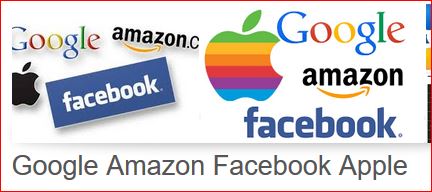My reading of this morning, together with; as I've added at the end of the read....
- Has our attention been commodified?
- Will big data create a new untouchable business elite? Dark side of the boon
Should the tech giants reprogram capitalism?
Source: the Economist; Nicholas Barrett, medium.economist.com 26 juillet 2017 11:08How to lose friends and alienate users
Rushkoff, who is also a professor at Queens College CUNY, recently discussed his ideas on our Babbage podcast, where he accused the Silicon Valley firms of “doubling down on extractive capitalism”. You can listen to his interview with Kenneth Cukie Click here..
In recent editions of Babbage, and in posts and comments section of this blog, we’ve grappled with two prominent ideas about the future of our economy.
Firstly, that a ‘the network effect’ could allow the tech companies with access to the most data to dominate their markets. By analysing the behaviour of their users, tech firms can cater to their needs of potential customers before those customers even realise they have them. If a tech company gains the largest share of any given market, it can also harvest more data for that market than the competition and strengthen its monopoly while its competitors play catch-up.
Secondly, that if you can access a service for free, or for a remarkably low price, you yourself might be the product. Facebook is free because your attention can be sold on to potential advertisers and your behaviour, messages and preferences can be analysed for lucrative market research. Similarly, when you use a ride hailing app, you’re not just providing Uber with revenue, you’re also providing them with the data they’ll need to create and manage a system of self-driving cars. That means that if you drive for Uber, you’re simultaneously creating the data they’ll need to move your job into the dustbin of history, and they’re doing it every time you touch your own steering wheel.
What Rushkoff means by using the term “extractive capitalism” is that the Silicon Valley tech companies are trapped in a cycle that forces them to collect and monetise more and more information about our behaviour every year so that they can carry on extracting profits from other industries. If any one of them slows down, somebody else will harvest the market and gain a significant foothold and so they all have to be accelerating all the time. According to Rushkoff, the old ambitions of the cyber-Utopians have been largely sidelined by the pressure to grow and to grow fast.
Rushkoff thinks the whole system is becoming unsustainable and unpopular. He wants the programmers, engineers and designers to disrupt the business model and replace it with something that creates and distributes wealth instead of extracting it from the rest of the economy.
Here’s what I want to know. Does Rushkoff’s description of the tech giants sound like it might be true? When you use Facebook, Google or Uber, do you feel like a customer or a resource? And could it be possible to redirect the efforts of the largest tech companies in a way that would make them responsible to the needs of the wider economy?
Is Rushkoff merely a Luddite for refusing to accept the benefits of the profit motive, or is it absurd for his critics to suppose that established economic systems needn’t adapt to profound technological upheavals?
Companies have been innovating, disrupting and expanding into monopolies for centuries, but I suspect that the internet has accelerated the process so fast that many of us have started to feel intimidated, often to the extent that we feel unable to plan, or even predict, the future of our own careers. In 2016, millions of people who had become nervous about the pace of globalisation turned against the political elite. I worry that without defining an endgame that goes beyond perpetual growth for the sake of growth, the tech giants could be the next global elite to find themselves standing in the crosshairs of widespread public resentment. And yet, I’m still not exactly sure what an economically and socially sustainable Silicon Valley would look like or how it would work. Do you?
Please post your comments below so we can share your thoughts and questions in an upcoming episode of Babbage. Or, if you don’t have a Medium account, you can e-mail them to radio@economist.com
Nicholas Barrett is a social media writer at The Economist.
- Has our attention been commodified?
- Will big data create a new untouchable business elite? Dark side of the boon

In my view, there is some relation of the problem with the tragedy of the commons. Voir la tragédie des communs.
ReplyDelete